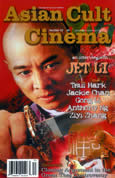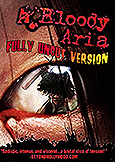 I
was at first expecting a by-the-numbers Korean take on such American
films as Deliverance, The Texas Chainsaw Massacre, The Hills Have Eyes,
or more recent fare such as Wolf Creek – basically any movie featuring
characters (urban dwellers out of their element) who are trapped and
tortured by psychotic rural locals. And while A Bloody Aria (2006) does
employ that all too common storyline as a starting point, it won't take
viewers more than a few minutes to realize writer/director Won Shin-Yeon
has something far more interesting in mind.
I
was at first expecting a by-the-numbers Korean take on such American
films as Deliverance, The Texas Chainsaw Massacre, The Hills Have Eyes,
or more recent fare such as Wolf Creek – basically any movie featuring
characters (urban dwellers out of their element) who are trapped and
tortured by psychotic rural locals. And while A Bloody Aria (2006) does
employ that all too common storyline as a starting point, it won't take
viewers more than a few minutes to realize writer/director Won Shin-Yeon
has something far more interesting in mind.
The movie opens with arrogant college music professor Park taking his
hot young protégé, In-jeong, for a country ride in his
new Mercedes. Slightly drunk (and with a desire to show off his manhood),
he purposely runs a red light. This draws the attention of a grizzled
highway patrolman (played by Han Seok-Gyu, star of the late 90's blockbusters
Shiri and Tell Me Something, among others). Already director Won is
playing with our expectations. In-jeong seems to understand and welcome
Park's attention and his promises to help her in her singing career.
She plays coy, but still comes off as if she knows the score and is
willing to go along. When the cop pulls them over and Park is ridiculously
rude, we believe we know exactly what will come next: Moon-jae (the
cop) will let them go only to chase them down and let the games begin.
But no. In-jeong is truly an innocent who is repulsed when Park's advances
become more brazen, and after Moon-jae tickets Park, he lets them go
and becomes a secondary character until the final thirty minutes of
the film. Hmmmm. That's odd.
 This
will be director Won's strategy throughout the whole movie: set up standard
expectations that will lull the viewer, and then reverse those expectations.
I haven't seen Won's first film, Scary Hair, but from the reviews I've
read it sounds like a rather standard story about a possessed hair piece
(if one could call that plot standard). Regardless, in A Bloody Aria,
Won masterfully manipulates the viewer's emotions and expectations,
creating a wonderful tension in nearly every scene.
This
will be director Won's strategy throughout the whole movie: set up standard
expectations that will lull the viewer, and then reverse those expectations.
I haven't seen Won's first film, Scary Hair, but from the reviews I've
read it sounds like a rather standard story about a possessed hair piece
(if one could call that plot standard). Regardless, in A Bloody Aria,
Won masterfully manipulates the viewer's emotions and expectations,
creating a wonderful tension in nearly every scene.
After pulling off the road to a secluded river beach, Park tries to
rape In-jeong and she flees into the surrounding woods. No sooner is
she gone than, one-by-one, a group of bumpkin thugs begins to show up
for some sort of beach picnic. And, oh yeah, they’re torturing
a young male victim they have bound inside a canvas sack. Perhaps, an
experienced ‘horror’ viewer will once more believe he knows
where all this is going. But no.
The real beauty of this movie is how Won twists the traditional roles
of victim and brutalizer into something different. The thugs are the
crazed locals we expect, but they are far from cardboard cutout villains.
Their leader, Bong-yeong (played by Lee Mun-Sik, who has the best role
in the movie) at first seems gentle and even simple-minded, but his
capacity to become a raging psychopath doesn't stay hidden long. He
stumbles upon In-jeong lost in the woods (after she bolted from the
professor’s sexual advances), promises her a ride to a train station,
and takes her directly back to the beach site from which she has just
escaped. Meanwhile, Professor Park has been hiding in his car while
the other thugs continue to beat and torture the young man from the
sack (they claim he got them kicked out of school). This young man character
in any other film would be a throwaway, a cipher whose only reason to
exist would be to up the body count and show how vicious Bong-yeong's
gang can be. But this character in A Bloody Aria will prove to be a
key player by the film's end; in fact, his relationship to one of the
other characters turns out to be the pin on which the entire plot pivots.
Actually, not one of the villains turns out to be exactly whom we thought
he would be. Throughout the course of the movie, it becomes clear that
even they are victims of one stripe or another, and this is what I loved
most about A Bloody Aria. Won gets quite a bit of mileage out of subtle
social criticism revolving around the military. Moon-jae, Bong-yeon,
and Bong-yeong's brother are all former gangbangers AND veterans, and
have been plenty scarred by their experiences.
Bong-yeong's brother, Oh-geun, has been rendered nearly deaf (his struggles
with his hearing aids become a minor plot point) and tends to live like
an animal. He is filthy, dressed mostly in rags, and is obviously mentally
ill. He hunts predatory birds by covering mice in rat poison and then
simply waits for the poisoned birds to drop dead from the sky. Bong-yeong
is himself a walking time bomb. As mentioned, he can at times seem timid
and simple-minded, but when crossed, he turns out to be a clever manipulator
and a sadistic opponent. Moon-jae the cop? Well, I can't say too much
about him without spoiling some of the best surprises of the movie,
so I'll pass.
The only two characters who remain psychologically and behavioristically
static are Professor Park and student In-jeong. Park is every bit the
arrogant coward we believe him to be at first sight, and though it appeared
in the beginning that In-jeong might be more "experienced"
than she seems, she is simply the sexy female victim, which means there
is no improbable hero in this movie – neither she nor Park suddenly
find courage and/or righteous strength within themselves – and
that alone helps the story to remain fresh and tense… and realistic.
Won also has an obvious penchant for black humor and uses it as another
weapon to keep viewers off-balance. In one example, Bong-yeong demands
that the Professor and the tortured man from the sack fight each other
for pure amusement. Out of nowhere the young man goes ballistic and
delivers a nasty beating to not only Park but Bong-yeong and the entire
gang as well. Park sneaks away, but then Bong-yeong and his gang wake
to find themselves buried to the waist in sand as the young man is pouring
gasoline on them. I know. It doesn't really sound funny on the page,
but trust me. The way Won handles the young man's explosion of rage
and the incredulous fear it strikes into the gang of thugs is quite
funny. I think. But then that’s the beauty of the film.
There is certainly a wide stripe of sadism that should satisfy fans
of this genre. Won has been tightening the screws of tension from the
first scene, and he never lets the level of repressed or realized violence
sag. When you expect a character to lash out, he may back off. When
you expect him to back off, he may lash out. I suppose if you had to
pick one overall theme to describe what the movie is about, I would
have to say it is a case study in the psychology of the bully. This
is where the complexity of the screenplay and Won's direction of the
actors really shine. Each character becomes a bully at some point and
a victim of bullying at another point, which blurs the usual black and
white morality with which these types of characters are generally branded.
By the end of the movie, the lines between the categories of "good"
and "evil" have pretty much disappeared.
As I said before, I won't spoil the plot twists of the final thirty
minutes, except to say that they all work quite well and do not seem
forced or too outlandish to be real. Once revealed, the twists seem
organic to the story and fit perfectly within the puzzle box Won has
been constructing all along. The final scenes, which are truly stark
and unpleasant, are lightened a bit by Won's use of "The Toreador
Song" from Bizet's Carmen, a tragic opera (aren't they all?) of
forbidden passion and murder. The irony is thick enough to cut with
a knife, but, as with all of Won's moves throughout the film, what may
seem heavy-handed is upon closer inspection a perfect complement of
purpose: we are all victims, particularly those who brutalize others.
Don't get me wrong, though. This is not some bleeding heart film that
pleads for understanding to excuse the violence some perpetrate on others.
It is partly a cynical and wholly black comedy on how useless terms
like "good" and "evil" really are in describing
the human animal. Even In-jeong, in her helplessness, aids in perpetuating
the cycle by becoming a subservient object for the others to use, abuse
and fight over, until a scene where she gains temporary possession of
a gun. Then even her bland innocence instantly shifts gears. The joy
of the powerless unexpectedly put into a position of power harkens back
to what we can now see as one of the controlling metaphors of the movie:
Oh-geun's method of hunting. Even the strong and clever predatory bird
can be brought low by a simple poisoned mouse. No, no one's behavior
escapes criticism in Won's world. There are no excuses, for there is
nothing to excuse. Animals, even those who believe in the thin veneer
of civility and compassion, are still animals when it comes to survival
and one's place in the food chain. In this respect, A Bloody Aria has
far more in common with a film like Sam Peckinpah's Straw Dogs than
the inbred psycho-family classics I mentioned in the first paragraph.
A Bloody Aria is a textbook example of a "horror" movie that
rises far above its genre trappings. Won Shin-yeon is definitely a director
to watch, for if he can surprise and delight within the confines of
this genre, I look forward to seeing what else he can do. I believe
I'll have to seek out Scary Hair after all. That plot about a possessed
hair piece suddenly sounds like it has real potential. Whatever the
case, definitely get ahold of A Bloody Aria. You will be shocked, thrilled,
repulsed, and entertained. Hell, you might even see some part of yourself
in there somewhere.
Click
to see more photos from this film.